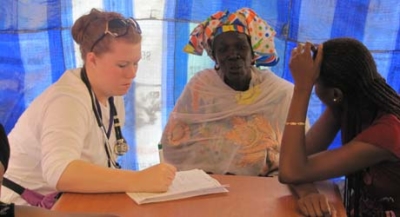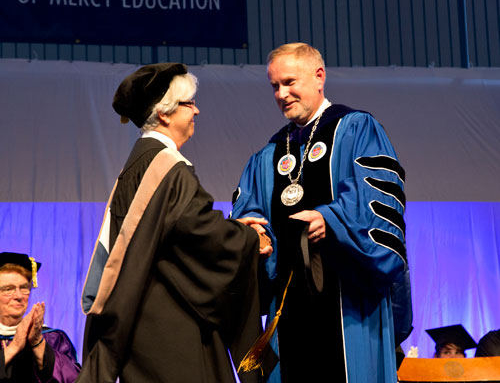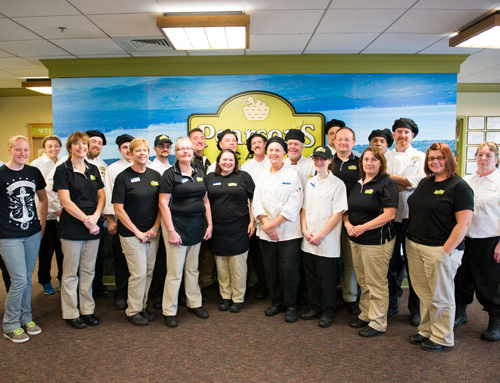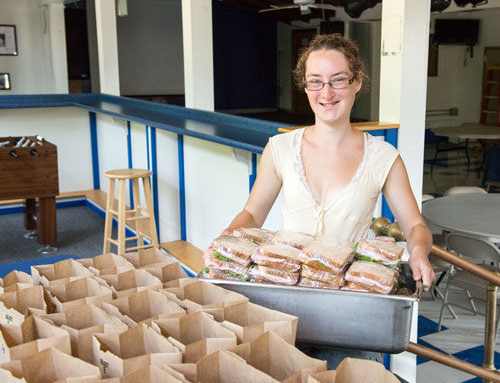 Senior nursing students travel to West Africa to study women’s health – and discover something about themselves.
Senior nursing students travel to West Africa to study women’s health – and discover something about themselves.
Anxiety. Poor working conditions. Limited access to health care. Those are just some of the issues facing the women who work on the fish docks in Senegal, but a group of Saint Joseph’s nursing students plans to change that.
Last May, six senior nursing students enrolled in NU 405: Community Health traveled to M’Bour, a coastal town in the West African country of Senegal, for 10 days. The trip, sponsored by Partners for World Health – a Maine-based non-profit that delivers medical resources to developing countries – satisfied the clinical portion of NU 405. Under the supervision of their clinical instructor, Ruth Smillie ’09, these six students surveyed approximately 160 Senegalese women.
“Our job was just to do an assessment,” says Smillie, an associate professor of nursing at Saint Joseph’s. “We wanted to talk to them to get some idea of what their needs are. That was our goal.”
During the semester leading up to their trip, the group of students met every Wednesday to research Senegal and discuss their plans. Having poured over data collected by the Centers for Disease Control and Prevention and the World Health Organization, they thought they had an idea of what they’d find in M’Bour.
“We had preconceived notions going into it,” says student Victoria Burkhart. “We expected to see a lot of hunger, a lot of hypertension.”
Instead, they were surprised to find nearly all of the Senegalese women they surveyed were not only well fed, but that they were overweight. And though 69 percent of the 160 women had some form of hypertension, the majority had prehypertension. “Overall, the Senegalese women were very physically healthy considering their extreme lack of health care,” says student Liza De Cesare. The population’s biggest health issues, the students learned, were mental.
“They have severe anxiety,” says Megan Pelletier. “They work in really bad conditions, and they’re worried about their children, they’re worried about feeding their kids. It’s a polygamous society, and a lot of them were unhappy about their sister wives. They’re stressed.”
The Senegalese women surveyed are part of a co-op that processes the seafood on M’Bour’s waterfront market. “They’re out every day in the hot sun, chopping snails out of shells,” says Smillie. “Shucking and stacking.”
“They work 12-hour days,” says student Jasmin Robbins. “They smoke the fish. And they bring their kids – they’ll have their kids on their backs as they work.”
As part of the health assessment, the Senegalese women identified poor working conditions as their second biggest health problem. “There were a lot of complaints of aches and pains and muscle soreness,” says Bridget Callahan. “Their backs were killing them, their knees, their hips. They had headaches. Everything just ached.” These ailments intensified what the women identified as their number one health problem: lack of money for health care – most notably, lack of money for pregnant women and children.
“Out of the women we surveyed, 97 percent had been pregnant before, 96 percent have children and 62 percent have lost children,” says Burkhart.
“They’ve had a lot of loss. Lost children. Issues with sickness, with malaria and dehydration,” says Smillie.
Over the students’ 10 days in Senegal, the majority of their time was spent conducting the surveys. As a result, there was little time for medical intervention. The students couldn’t necessarily address specific issues of sickness – though they did help some Senegalese women and children seek physicians’ attention. Their plan, as it was from the beginning, was to get a basic understanding of the health needs of the women of M’Bour.
“We made a very broad assessment,” says Callahan. “No one from Saint Joseph’s had been there before. We were asking general questions to find out what we want to learn more about. Our hope is that next year’s students go there to work off what we found and then dive deeper.”
Still, the nursing students found ways to teach the Senegalese women methods to take care of themselves. They demonstrated simple steps, like adjusting their diets, stretching and deep breathing, to improve their health.
“They eat fish and rice for every meal. The fish is coated in salt – that’s how they preserve it,” says student Ariana Andrews-Wilson. “We told them not to add any more salt to their food, and to eat fruit and vegetables as often as they can.”
“Many of these women have anxiety over the same issues, so we taught them the concept of a support group,” says Callahan.
“It gives them a chance to open up, and they’re thankful for that,” says De Cesare.
“It’s much different in the United States,” says Pelletier. “Here, you can easily go on the Internet and look up your symptoms, or you can go to the hospital and tell the doctor what’s wrong. The Senegalese women we talked to, they don’t go to the doctor. The only time they go to the doctor is when they’re giving birth – not before, not after.”
The six Saint Joseph’s students who made the trip – Burkhart, De Cesare, Pelletier, Robbins, Callahan and Andrews-Wilson – all have plans to go back.
“We want to open up a clinic there,” says Pelletier. “There’s this big empty building near the fish market that nobody’s using. Once we become nurses, we all want to go back. There’s so much more we can do. It’s exciting.”



